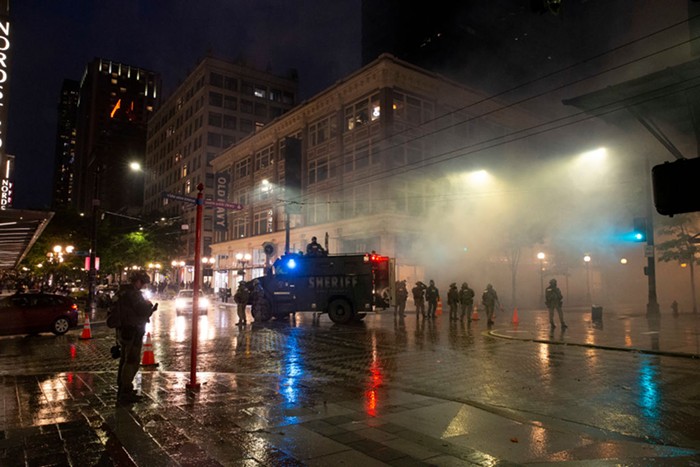
Tear gas is technically not a gas—it’s a fine dispersion of tiny particles that cling to your skin, hair, and clothes, and react to liquids like sweat, oil, and makeup. If you think you might find yourself exposed, you can prepare with some simple low-tech gear, like a gas mask—but you’ll want to make sure you’ve come prepared with the right kind of mask, because the equipment you just bought for coronavirus protection might not be effective against chemical agents.
The International News Safety Institute recommends a respirator that’s fitted to the shape of your face—which means you’re better off getting it in person rather than online so you can make sure it forms a tight seal. Bring spare canisters, because they only last a few hours. And remember, tear gas affects any exposed tissues, so you’ll need to protect your mouth, nose, and eyes.
And just so you’re prepared, staying safe isn’t cheap. An entry-level mask that can protect you from tear gas is going to run around $150. Expect to spend $500 on the really good ones.
There are instructions out there for making your own gas masks, and although I do love a good DIY project, there’s a bit more at stake here than weaving a basket. Maybe you’ll be able to successfully craft a functioning gas mask, but if my health and ability to breathe was at stake I’d shell out for something made by professionals. The worst time to find out that your homemade gas mask doesn’t work is when you need to use it.
A few more tips for keeping yourself safe: don’t wear makeup, don’t wear contact lenses, and don’t wear sunscreen—they can react with tear gas to make the reaction worse. But of course, you should protect yourself from the sun, which means you should wear coverings over your skin; and since that might make you sweat more, bring water.
If police shoot tear gas in your direction, hold your breath if you can. If you want to get away from the cloud (since removing yourself from danger is generally the first step of any emergency response), head for higher ground, since the particles tend to be heavier than air. Don’t touch your face. Hold out your arms and legs to let wind carry the particles away from you.
Get out of your clothes as soon as it’s safe to do so, but don’t start stripping right away since there may still be irritants in the air. When you’re in a safe place, don’t take clothes off by lifting them over your head—cut them off of your body to avoid further face exposure. If you head home, keep away from your carpets, upholstery, and bedding, since those things are nearly impossible to decontaminate once they come into contact with tear gas. Clothing should be double-bagged in plastic and thrown away. You can try to clean your clothes, but it could take many loads and the more you handle those materials, the more you’re risking re-exposure.
What should you rinse your face with? There are differing opinions on that—some experts recommend milk or Milk of Magnesia, which might be helpful against pepper spray (which is an oil-based substance, different from tear gas) but could be non-sterile and lead to infection or further injury. Other experts recommend water, but depending on the exposure, a lot of water might be needed to effectively wash everything away. Unless you know exactly what you’ve been gassed with, large amounts of water or saline solution is probably your best bet.
One reason it's so hard to know the best way to treat exposure is because there's relatively little research into exactly how tear gas affects people, especially when combined with other substances and over the long term.
Why are police so eager to use a substance that isn't fully understood? Hm, who knows, somebody ought to ask them.



















